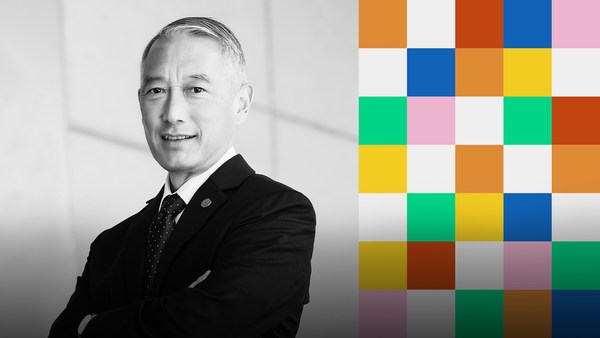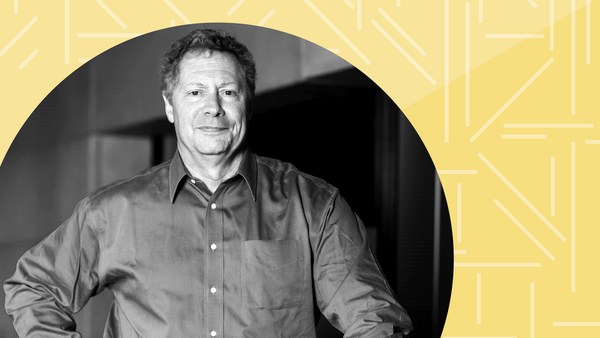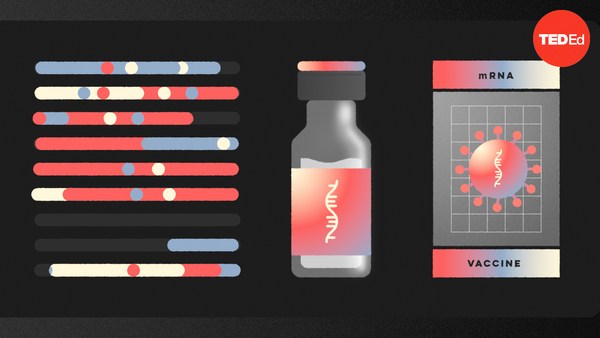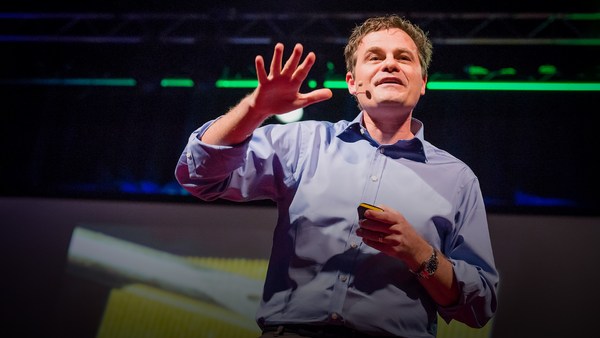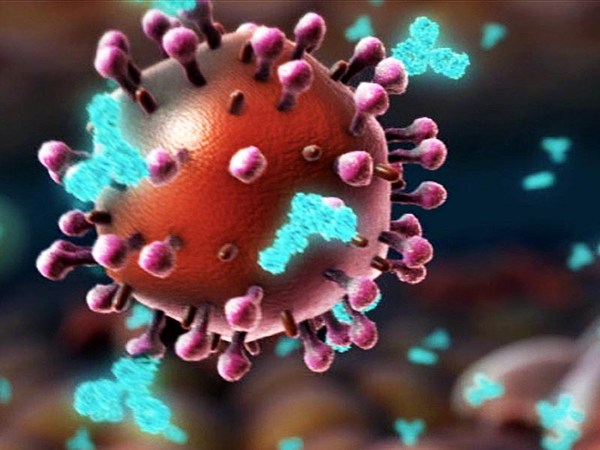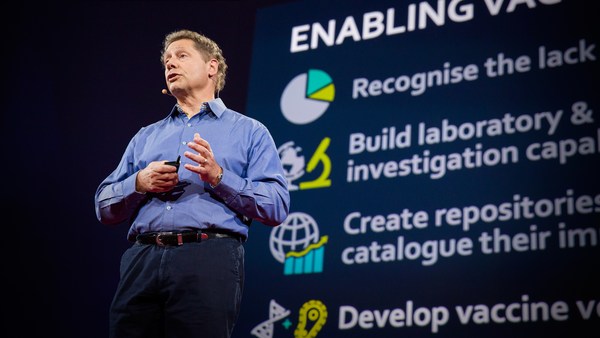I study rumors. Not tabloid gossip or the kind of rumors that are making stock markets crash -- or soar -- but the kind of rumors that affect your health ... and the world's health. Like eating a lot of garlic or drinking a lot of water is going to help protect us from coronavirus -- if only. Rumors have a bad reputation. They're seen as not fact, wrong, or "just a rumor." But I've studied rumors for years, and one thing I've learned is that they all have a story, and often, an important story.
One of the most moving or alarming rumor episodes that I investigated was in northern Nigeria. I was working with UNICEF's Global Immunization programme. And it wasn't the rumors themselves that I found so alarming; it was the global impact of those rumors. The rumors were suspecting that the polio vaccine was actually a contraceptive. It was controlling populations -- or maybe it caused AIDS. No, no, maybe it's the CIA spying on them or counting them. I mean, why else would they have people knocking on their door again and again with the same polio vaccine? When children were dying of measles, no one was coming with measles vaccines.
This wasn't about getting the facts right. This was about trust. It was about broken trust. Why so much distrust? It wasn't the mothers who were particularly distrusting, actually. It was the local leaders, the religious leaders, the local political leaders. It was the governor of the state of Kano who decided to boycott the entire polio eradication effort in that state ... for 11 months.
Why such distrust? Well, it was 2003. It was two years after 9/11. And they were convinced that the West, and particularly the United States, was at war with Muslims. And they knew that the West, and particularly the United States, was a huge supporter -- and funder -- of the global polio eradication initiative. They had their reasoning. That lack of trust, that "just a rumor or two" cost the polio eradication program 500 million dollars to reset the clock, to regain the progress lost during those 11 months and beyond. The Nigerian strain of the polio virus traveled to over 20 countries, as far as Indonesia. The cost of a rumor.
The Nigeria episode was one of many episodes that I investigated when I was with UNICEF and earned the title of the "director of UNICEF's fire department."
(Laughs)
We -- at that point I realized I never really had enough time. I was too busy putting out the fires and not enough time to understand what was driving not just the individual episodes, but why was there an epidemic of these happening around the world.
I left UNICEF and went back to research -- applied research -- and I set up in 2010 what I called the Vaccine Confidence Project at the London School of Hygiene and Tropical Medicine. I convened anthropologists, epidemiologists, psychologists, digital media specialists and mathematical modelers. We set ourselves the task to investigate historic episodes of rumors and their impacts, from trying to figure out what were the early signals, what were the amplifying factors and the impacts, how did they get traction, so we could start to understand what we should be looking for, how we could help governments and immunization programs be more alert and responsive to early signals of problems. It was an early warning system.
In 2015, we developed a vaccine confidence index. It's a survey trying to investigate to what extent do people agree or disagree that vaccines are important, they're safe, they're effective -- they work -- and somehow they're compatible with my religious beliefs. We've run this with over hundreds of thousands of people around the world, trying to get our finger on the pulse of confidence and trust, but also, more importantly, looking at when that trust goes up or down, because we want to see when it starts to decline, that's the time to jump in, to get there before there's a crisis like the Nigerian one. We also set up 24-7 media and social media monitoring around the world -- multilanguage -- listening for what's going on in vaccine conversations, trying to pick up early concerns or changes in sentiment that we should be paying attention to.
We've created an ecosystem of different types of information to try to understand: what are the public thinking and how can we engage? We look for early signals. When we find one, we have a global network of collaborators in a number of countries who have more local intelligence in that setting to try to understand -- is this signal misinformation, or is something brewing that we should know about?
In London, we have a bigger picture. We watch the swarms of rumors, not just traveling locally but jumping countries. We've seen them jump from Japan over to Colombia, through Europe and around. They move. We live in a hyperconnected environment.
One of the things that we found fascinating, and we've learned a lot in the last 10 years -- this is our 10th anniversary, this didn't start yesterday, this rumor problem -- and one of the things we've learned is in our global monitoring, that Europe is the most skeptical region in the world. France won the prize, actually.
(Laughter)
By far. And actually some of those rumors have traveled to other parts of the world. But we were trying to understand Europe. Hmm. Why Europe? I thought the US was really -- had some of the most skepticism, but boy, I was wrong.
And a political scientist, a colleague we work with, Jon Kennedy, he took our data from 28 European countries and he looked at it and correlated it with political opinion polling. And what did he find? He found that people who are most likely to vote for a populist party also were the ones most likely to strongly disagree that vaccines were important, safe or effective. What did we learn? Vaccines cannot escape the political and social turbulence that surrounds it. Scientists were unprepared for this tsunami of doubt and questions and distrust.
What -- why are vaccines so ripe for resistance? Well, we identified a number of things, but one: they're highly mediated by government that requires, regulates and sometimes recommends vaccines -- or often recommends and sometimes requires. Big business makes vaccines, and neither institution, government or big business, are high in the trust ranks these days. And then there's scientists who discover and develop vaccines, and they're pretty elite and not accessible to the general public, at least the language they speak. Third, we're in a hyperconnected environment with social media these days, and people can share their unfettered views, concerns, anxieties and worries and find a lot of people that think the way they do, and think maybe their worries are worth paying attention to. And finally, vaccines touch every single life on the planet. What other health intervention, besides water, touches every single life? So if you're looking for something to disrupt, it's a perfect stage.
Perhaps that's one of the reasons that we need to pay more attention and rebuild our trust in issues. People are asking all kinds of questions. They're asking, why are vaccines -- and these are the kinds of things we're hearing in our social media -- why can't my child have a personalized vaccination schedule? What's the wisdom of so many vaccines? What about all those ingredients and preservatives? These are not crazy people, they're not uneducated; they're actually worried mothers. But some of them have come to me and said, "We feel ignored, we feel judged if we ask a question, and we even feel demonized that maybe we're part of some antivaccine group."
So we have some listening to do. And maybe that's why last year, there was research that found that in six months in 2019, online -- this was with hundreds -- 100 million different users on social media -- although the numbers of individuals who expressed in their online groups, they were positive, as groups, the ones who were the most negative were recruiting the conversations in the middle that were undecided about whether they wanted to get vaccines. The highly negative -- what we might call the antivaccine groups -- were recruiting the undecided at a rate 500 percent faster than the provaccine groups. 500 percent faster. They were more nimble, they were responsive and they were listening.
Most people believe that vaccines are good and they believe in their importance. But that belief is under attack. We need to build in more opportunities for conversation. And there are ways to do it.
It's not easy for some health professionals to have conversations where their authority is questioned. It's uncomfortable. And they're just too busy to listen to all these questions. But we need to do something about that, because we're losing a lot of concerned parents that just want a conversation. We should get volunteers trained to sit in waiting rooms, to be on hotlines, to have online chat forums, to have chat boxes. In younger kids, with younger kids in school, teach them about immune systems and teach them that actually, you know that vaccine your little brother got? Well, it just inspired your natural immune system. It's a great thing and this is why. We need to build that confidence; we need to listen.
Despite all this questioning -- and there's a lot of it -- I hear probably more than a lot of people -- I am an optimist. And my optimism is with a younger generation. The younger generation who actually now are becoming very aware of the risks of social media, the false news, the false identities, and they're starting to embrace science. And some of them are a group of children whose mothers refused to vaccinate them.
Last spring of 2019, 18-year-old Ethan Lindenberger went on Reddit and put out a post. "My mother doesn't believe in vaccines. She's really worried they cause autism. In fact, she strongly believes that. But I'm 18. I'm a senior in high school. I can drive a car, I can vote and I could go get my own vaccine. Can someone tell me where to get it?" That post went viral. It started to get a whole younger movement going.
I saw Ethan speak at a conference, the Global Vaccine Summit at the EU last fall. He spoke eloquently, and I was impressed, in front of a whole forum. He told his personal story, and then he said to the group, he said, "You know, everybody talks about misinformation, but I want to tell you about a different kind of misinformation, and that's misinformation that says that people like my mother, who is a loving mother, is a bad person because she doesn't give me vaccines. Well, I want to tell all of you that she didn't give me a vaccine, because she loves me and because she believed that that was the best thing for me. I think differently and I will never change her mind, but she's not a bad person." That was the message from a teenager. Empathy, kindness and understanding.
We have an abundance of scientific information to debunk false rumors. That's not our problem. We have a relationship problem, not a misinformation problem. Misinformation is the symptom, not the cause. If people trust, they'll put up with a little risk to avert a much bigger one.
The one thing that I want and I hope for is that we as a medical and health community have the moral courage and humility to productively engage, like Ethan, with those who disagree with us. I hope so.
Thank you.
(Applause and cheers)
